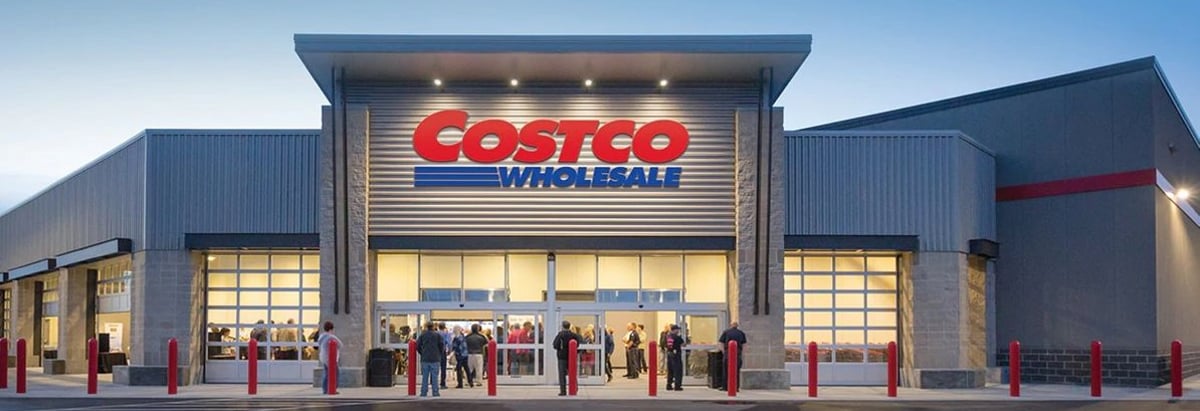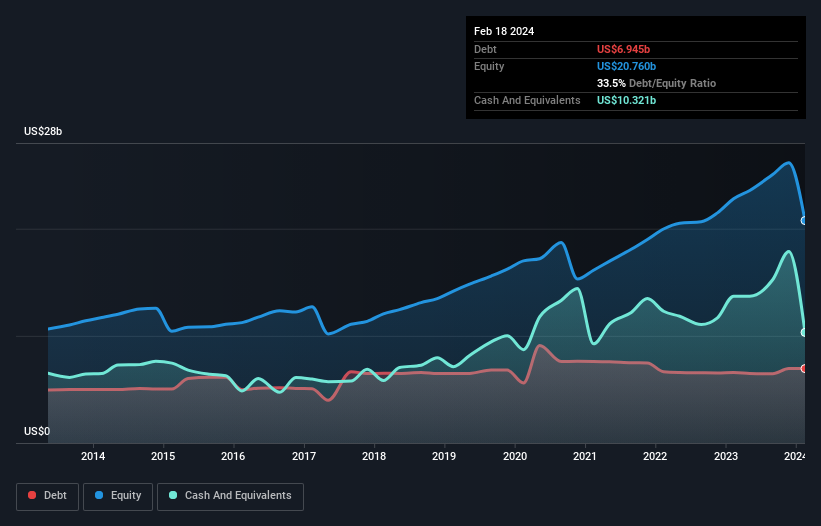- United States
- /
- Food and Staples Retail
- /
- NasdaqGS:COST
We Think Costco Wholesale (NASDAQ:COST) Can Manage Its Debt With Ease

Some say volatility, rather than debt, is the best way to think about risk as an investor, but Warren Buffett famously said that 'Volatility is far from synonymous with risk.' When we think about how risky a company is, we always like to look at its use of debt, since debt overload can lead to ruin. As with many other companies Costco Wholesale Corporation (NASDAQ:COST) makes use of debt. But should shareholders be worried about its use of debt?
What Risk Does Debt Bring?
Generally speaking, debt only becomes a real problem when a company can't easily pay it off, either by raising capital or with its own cash flow. If things get really bad, the lenders can take control of the business. However, a more usual (but still expensive) situation is where a company must dilute shareholders at a cheap share price simply to get debt under control. Having said that, the most common situation is where a company manages its debt reasonably well - and to its own advantage. The first thing to do when considering how much debt a business uses is to look at its cash and debt together.
Check out our latest analysis for Costco Wholesale
What Is Costco Wholesale's Net Debt?
The image below, which you can click on for greater detail, shows that at February 2024 Costco Wholesale had debt of US$6.95b, up from US$6.58b in one year. But it also has US$10.3b in cash to offset that, meaning it has US$3.38b net cash.

How Strong Is Costco Wholesale's Balance Sheet?
We can see from the most recent balance sheet that Costco Wholesale had liabilities of US$34.7b falling due within a year, and liabilities of US$10.9b due beyond that. Offsetting this, it had US$10.3b in cash and US$2.78b in receivables that were due within 12 months. So its liabilities total US$32.5b more than the combination of its cash and short-term receivables.
Of course, Costco Wholesale has a titanic market capitalization of US$324.2b, so these liabilities are probably manageable. But there are sufficient liabilities that we would certainly recommend shareholders continue to monitor the balance sheet, going forward. Despite its noteworthy liabilities, Costco Wholesale boasts net cash, so it's fair to say it does not have a heavy debt load!
And we also note warmly that Costco Wholesale grew its EBIT by 10% last year, making its debt load easier to handle. There's no doubt that we learn most about debt from the balance sheet. But it is future earnings, more than anything, that will determine Costco Wholesale's ability to maintain a healthy balance sheet going forward. So if you want to see what the professionals think, you might find this free report on analyst profit forecasts to be interesting.
Finally, while the tax-man may adore accounting profits, lenders only accept cold hard cash. Costco Wholesale may have net cash on the balance sheet, but it is still interesting to look at how well the business converts its earnings before interest and tax (EBIT) to free cash flow, because that will influence both its need for, and its capacity to manage debt. During the last three years, Costco Wholesale produced sturdy free cash flow equating to 71% of its EBIT, about what we'd expect. This cold hard cash means it can reduce its debt when it wants to.
Summing Up
While Costco Wholesale does have more liabilities than liquid assets, it also has net cash of US$3.38b. And it impressed us with free cash flow of US$6.2b, being 71% of its EBIT. So is Costco Wholesale's debt a risk? It doesn't seem so to us. The balance sheet is clearly the area to focus on when you are analysing debt. But ultimately, every company can contain risks that exist outside of the balance sheet. To that end, you should be aware of the 1 warning sign we've spotted with Costco Wholesale .
If you're interested in investing in businesses that can grow profits without the burden of debt, then check out this free list of growing businesses that have net cash on the balance sheet.
New: AI Stock Screener & Alerts
Our new AI Stock Screener scans the market every day to uncover opportunities.
• Dividend Powerhouses (3%+ Yield)
• Undervalued Small Caps with Insider Buying
• High growth Tech and AI Companies
Or build your own from over 50 metrics.
Have feedback on this article? Concerned about the content? Get in touch with us directly. Alternatively, email editorial-team (at) simplywallst.com.
This article by Simply Wall St is general in nature. We provide commentary based on historical data and analyst forecasts only using an unbiased methodology and our articles are not intended to be financial advice. It does not constitute a recommendation to buy or sell any stock, and does not take account of your objectives, or your financial situation. We aim to bring you long-term focused analysis driven by fundamental data. Note that our analysis may not factor in the latest price-sensitive company announcements or qualitative material. Simply Wall St has no position in any stocks mentioned.
About NasdaqGS:COST
Costco Wholesale
Engages in the operation of membership warehouses in the United States, Puerto Rico, Canada, Mexico, Japan, the United Kingdom, Korea, Australia, Taiwan, China, Spain, France, Iceland, New Zealand, and Sweden.
Solid track record with excellent balance sheet.
Similar Companies
Market Insights
Community Narratives



